Politics
Driverless trucks on California highways? Legislators don’t trust the DMV to ensure safety
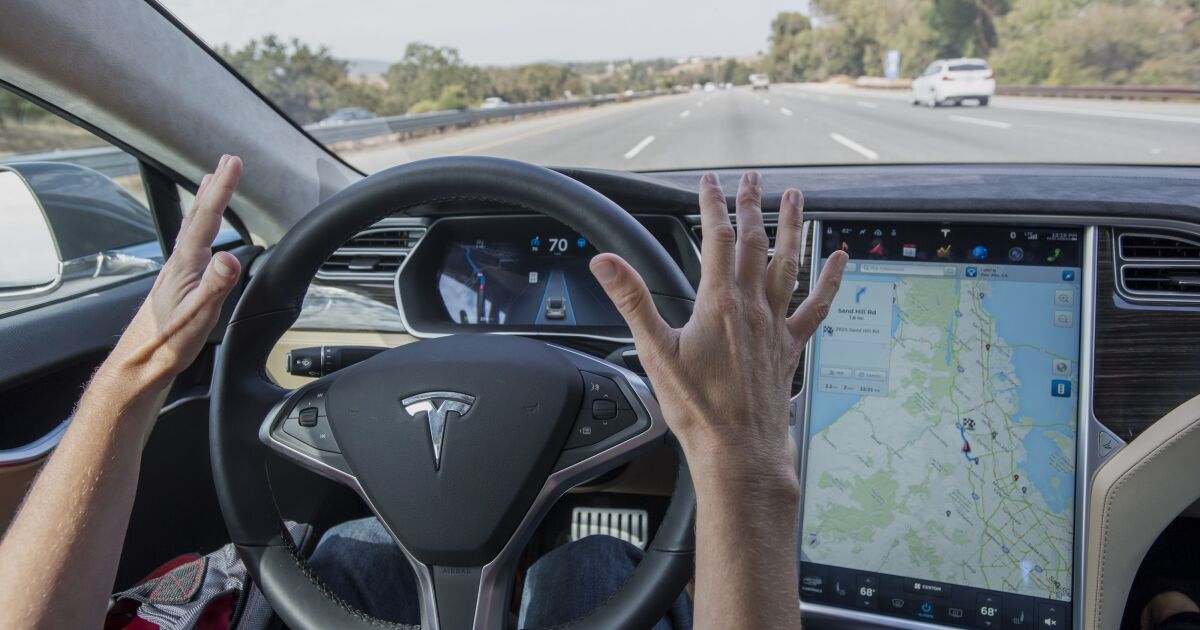
When Teslas are in self-driving mode, they’ve been recorded crossing into oncoming traffic and hitting parked cars. But what would happen if an 80,000-pound, 18-wheel driverless truck suddenly went off the rails?
That’s an experiment some California legislators aren’t ready to run. They argue that the state Department of Motor Vehicles has so badly mishandled the driverless car industry that it can’t be trusted to oversee big rigs barreling down the highways autonomously.
AB 316 — which would wrest control of driverless truck testing and deployment from the DMV and require human drivers in the cab for at least five years while a safety record is collected — passed in the Assembly on Wednesday. The bill now goes to the state Senate and if passed will head to Gov. Gavin Newsom for his signature.
Its proponents argue that effective laws and regulations depend on shared data, institutional trust and public transparency, and that the DMV is struggling with all three.
“Ultimately, this issue is of such importance and relevance that we can’t abdicate our responsibility to the DMV, and the DMV doesn’t have the capacity to think about the consequences going forward,” Assemblyman Ash Kalra (D-San Jose) said in an interview.
Laura Friedman, chair of state Assembly’s transportation committee, explains her lack of trust in the DMV. (California State Assembly)
In a recent hearing, Laura Friedman (D-Glendale), the head of the Assembly’s transportation committee, put it more plainly: “The DMV has not done a great job at regulating this space.”
DMV Director Steve Gordon did not respond to a request from The Times for comment. In fact, the former Silicon Valley executive has rarely spoken with the media about anything at all since Newsom named him to the post in 2019.
The driverless truck industry, however, has pushed back hard, saying AB 316 would harm California’s technological competitiveness. Meanwhile, public debate over the bill is highlighting concerns about safety and job loss, as human drivers of commercial vehicles face replacement by computer systems programmed with artificial intelligence.
How we got here
The Legislature handed driverless vehicle regulation to the DMV when it passed its first bill governing such vehicles in 2012. Hearings held at the time focused on the wonderful future ahead for driverless cars — no more crashes, no more traffic jams.
Autonomous vehicle engineers, including former Google executive Anthony Levandowski, made safety claims that went largely unchallenged. “Our data so far is showing that the technology is able to drive safer than our trained and professional drivers at the wheel,” he said.
Because AI vehicles theoretically could drive at high speeds bumper to bumper, “it’ll really clear up the 110 and the 405 and the 710,” said Mark DeSaulnier, then the chair of the state Senate transportation committee. (DeSaulnier is now a member of Congress.)
Eleven years later, those freeways are as jam-packed as ever. And the safety information on those self-driving passenger cars? It’s spotty — in large part because the DMV and the vehicle industry are working to keep key safety data out of public view.
In 2021, after a public records filing by an unidentified individual, the DMV invited Waymo to seek a court injunction to prevent the agency from releasing full crash reports.
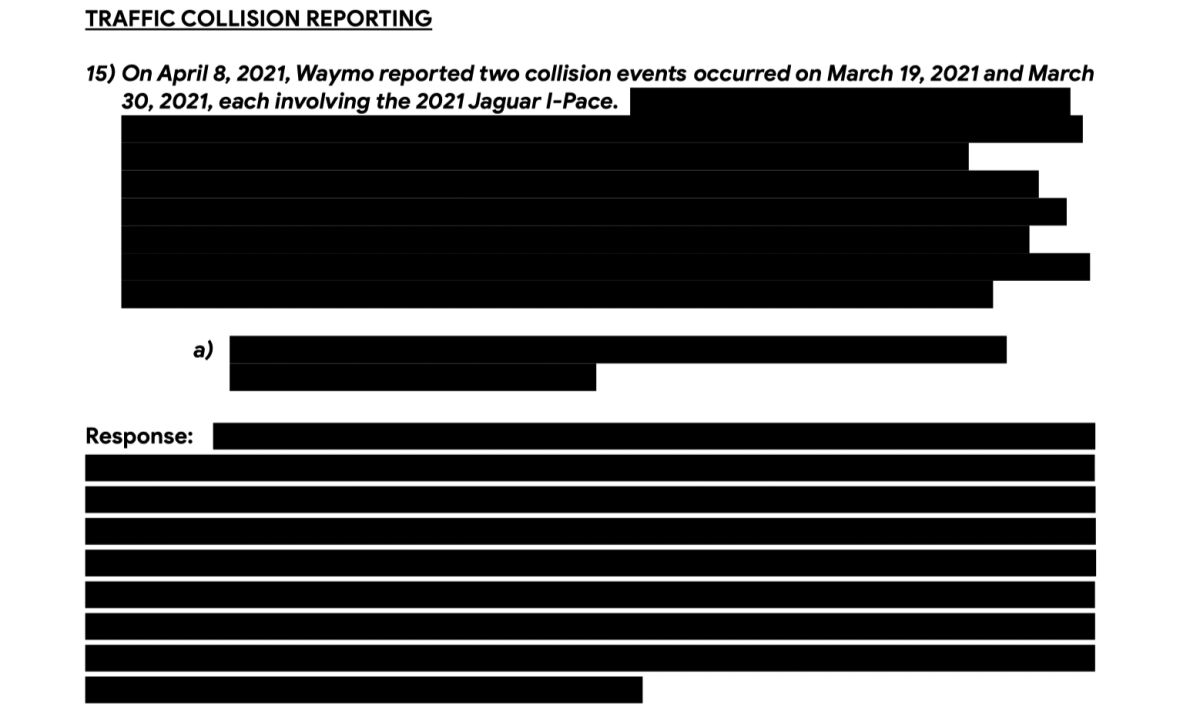
Waymo and the DMV worked together on a precedent-setting court agreement that allows the company to black out safety information on the public version of its robotaxi crash reports.
(California Department of Motor Vehicles)
After the injunction was granted, the DMV — with the legal assistance of California Atty. Gen. Rob Bonta — cut a deal with Waymo to keep the information concealed on the grounds of protecting company trade secrets, according to court records. The deal, approved in Sacramento County Superior Court, allows Waymo to redact most of the details of collision reports as well as information on how the company handles driverless car emergencies, for at least two years.
Although those vehicles, thus far, have not killed or seriously injured anyone in the state, news reports show they can cause plenty of problems on the road: They tend to brake suddenly; block traffic as they pause to decide what to do; cruise through construction zones; and “brick” or stall in traffic, requiring a human on the scene to move the car. They’ve even fled from police.
What Tesla has to do with it
Although the performance of Waymo and Cruise robotaxis operating in San Francisco concerns many legislators — including Friedman — what is especially troubling, they say, is the DMV’s relationship with Tesla.
That is “what really tilted the balance for me” to support AB 316, Friedman said. At a committee hearing in March, she slammed the DMV “particularly in regard to one particular auto manufacturer and their overstated promise of what their vehicle actually is capable of doing.” Friedman argued that Tesla’s marketing claims are “leading to confusion from the drivers and purchasers of those vehicles and to lots of tragic accidents that could have been prevented with better oversight from the DMV and [federal] regulators.”
The department allows the electric-car company to test driverless technology on California roads without a permit, while other companies are expected to conform to rules that require permits and trained test drivers. Tesla has said that the feature it calls Full Self-Driving is a technology that requires human attention, and doesn’t require a permit, according to email records released under California’s Public Records Act by the court transparency organization PlainSite.
Meanwhile, the DMV allows Tesla to market this technology package as Full Self-Driving. That name appears to violate the DMV’s own rule — now a state law — against marketing cars as autonomous when they aren’t capable of fully driving themselves. The DMV said the matter is under investigation, but that investigation has dragged on for more than two years.
“The lack of information after two years is deeply concerning,” said Lena Gonzalez (D-Long Beach), who heads the state Senate’s transportation committee.
When asked about the issue recently, Newsom said he had “great confidence” in Gordon and his team. The governor said he’s grateful for legislative oversight. But pressed on the specific criticisms aimed at the DMV, he said: “Forgive me for not being alarmed or shocked.”
What is — and isn’t — at stake
The driverless technology industry, centered in Silicon Valley, is opposed to AB 316. “The economic impact of this bill is going to be devastating,” said Jeff Farrah, who heads the Autonomous Vehicle Industry Assn., which represents Waymo, Cruise, Motional, Aurora Innovation and other driverless car and truck technology companies. “California will cede its position as a leader in the development of autonomous vehicles to other states that are embracing this lifesaving technology at a rapid pace.”
Bill supporters regard such statements as alarmist hyperbole.
“It’s easy for people to threaten to leave,” said Assemblywoman Cecilia Aguiar-Curry (D-Winters), co-author of the bill, which is supported by the Teamsters union. “People aren’t going to leave because of this,” she said, noting the rich pool of technology talent clustered in Silicon Valley. Tesla, in fact, announced in February that it would move its Texas engineering team back to California, in part to attract and retain talented engineers.
The industry notes that states including Texas, Arizona, Georgia and Florida already allow driverless trucks on public highways. AB 316 would slow down plans to deploy driverless trucks from Southern California seaports eastward across the country.
The bill would not block driverless truck deployment at the ports themselves or on private property. Asked whether the Port of Long Beach plans to allow testing anytime soon, Anthony Otto, chief executive of the port’s container terminal, said no. “It’s completely a safety issue,” he said.
Aguiar-Curry said for now she’s happy to let companies test driverless trucks away from California‘s highways, citing her constituents’ safety concerns.
She also contends that the trucking industry’s main concern is not safety but profit.
The business case for autonomous trucks is the vast reduction in labor costs when humans are no longer needed to do the driving. Replacing the estimated 350,000 truck drivers who work in California alone would lead to huge cost savings.
Notably, driverless truck companies are not yet profitable, and cash flow is a big issue. With rising interest rates, capital is harder to come by and the companies need to show progress to attract more investment before their cash runs out. One autonomous truck company, Embark, went bust earlier this year.
Driverless truck companies are funneling millions of dollars into research and development and studies documenting their safety and reliability profile. A recent study from Waymo on collision avoidance suggests the reaction time is quicker for the AI driver than for human beings.
However, as it fights AB 316, the Autonomous Vehicle Industry Assn. continues to make debatable claims about safety.
Farrah has said: “Autonomous trucks are safer than trucks operated by humans.” Former California Highway Patrol Officer Chris Childs, a paid consultant for the driverless vehicle industry group, recently told legislators that “in my opinion, autonomous technology is safer than a human driver.”
Although no major crashes involving driverless trucks have been reported, data on whether AI drivers are safer than humans aren’t yet able to settle the question. A paper published by the research group Rand Corp. said vehicles may have to be driven hundreds of billions of miles to make the case.
No legislator is alleging that AI-driven cars are necessarily less safe than those driven by humans. They’re saying no evidence has been presented, and the technology still has enough bugs to warrant more study, particularly before it’s extended to big-rig trucks.
Just having an AI semi truck stop dead on a freeway for a period of time could cause major traffic problems, said Assemblymember Laurie Davies (R-Laguna Niguel): “If something happens on [some stretches of] the 5 Freeway, there’s no way of getting around it. What do you do? How long does it actually take to move something like this?”
AB 316 would “give us the opportunity to find out what are the glitches when we’re looking at large vehicles like this, and how we fix them so they don’t happen again,” Davies said.
For its part, the driverless trucking industry contends that the Legislature lacks the expertise to adjudicate the issue correctly.
“The legislation puts the determination for very important safety and fact-based decisions in the hands of the Legislature instead of the able and experienced regulators at the DMV,” said Mufaddal Ezzy, head of government relations for Aurora Innovation.
Waymo head of government relations Annabel Chang said via email: “If the legislature takes away decision-making power from these experts and creates a complicated political process to approve the operation of autonomous trucks, it will result in indefinitely delayed improvements to road safety and sustainability.”
The experience level of the DMV regulators, however, is thin. The DMV official in charge of driverless car regulation, Miguel Acosta, has no prior experience in vehicle safety regulation or in motor vehicle technology. Before being named to his current job in 2018, he ran customer service for DMV vehicle registration and managed its field offices.

Politics
Park Police union says officers ‘did everything they could’ during DC anti-Israel riot

Following the protests at Union Station by anti-Israel agitators defacing federal property in protest of Israeli Prime Minister Benjamin Netanyahu’s address to Congress, a Park Police union is pushing back against criticism that only a few arrests were made.
Thousands of Hamas-sympathizing agitators descended on Washington, D.C., Tuesday, at one point defacing federal monuments with phrases in support of the terrorist group responsible for the Oct. 7 attacks in Israel, saying, “Hamas is coming.”
Twenty-three people were arrested at the protests, but some have suggested that number should have been higher.
Sen. Marco Rubio, R-Fla., posted on X, “How many more times are they going to allow leftist degenerates who support terrorism and hate America to vandalize property and attack police? There should have been hundreds of arrests today in D.C. not just 23.”
HOUSE REPUBLICANS REPLACE AMERICAN FLAGS AT UNION STATION AFTER ANTI-ISRAEL PROTESTS
The Columbus Memorial Fountain at Union Station during an anti-Israel protest on the day Israeli Prime Minister Benjamin Netanyahu addressed a joint meeting of Congress on Capitol Hill in Washington July 24, 2024. (Reuters/Seth Herald)
But the U.S. Park Police Labor Committee is pushing back.
“Our officers on the ground did everything they could to protect life and property. In fact, despite having only 29 officers available to mitigate damage — 29! — with no additional help from the Department of the Interior, we processed several arrests for charges ranging from assault on a police officer to destruction of government property,” Kenneth Spencer, chairman of the United States Park Police Fraternal Order of Police, said in a statement.
“That’s why it’s so disheartening to hear some members of Congress and members of the media, many of whom describe themselves as ‘champions’ of law enforcement, suggesting that officers gave protesters a ‘pass’ or that insufficient arrests were made.
“Nothing could be further from the truth. Anyone who truly cares to understand the problem would see that our officer staffing crisis is at the root of our agency’s mission readiness. A small unit of 29 officers arrested 10 individuals while being assaulted by a mob of thousands. We simply did not have the staffing or resources to accomplish a mass arrest operation.”
SEE IT: THE MOST DRAMATIC PHOTOS FROM WEDNESDAY’S PRO-HAMAS WASHINGTON, D.C. PROTESTS
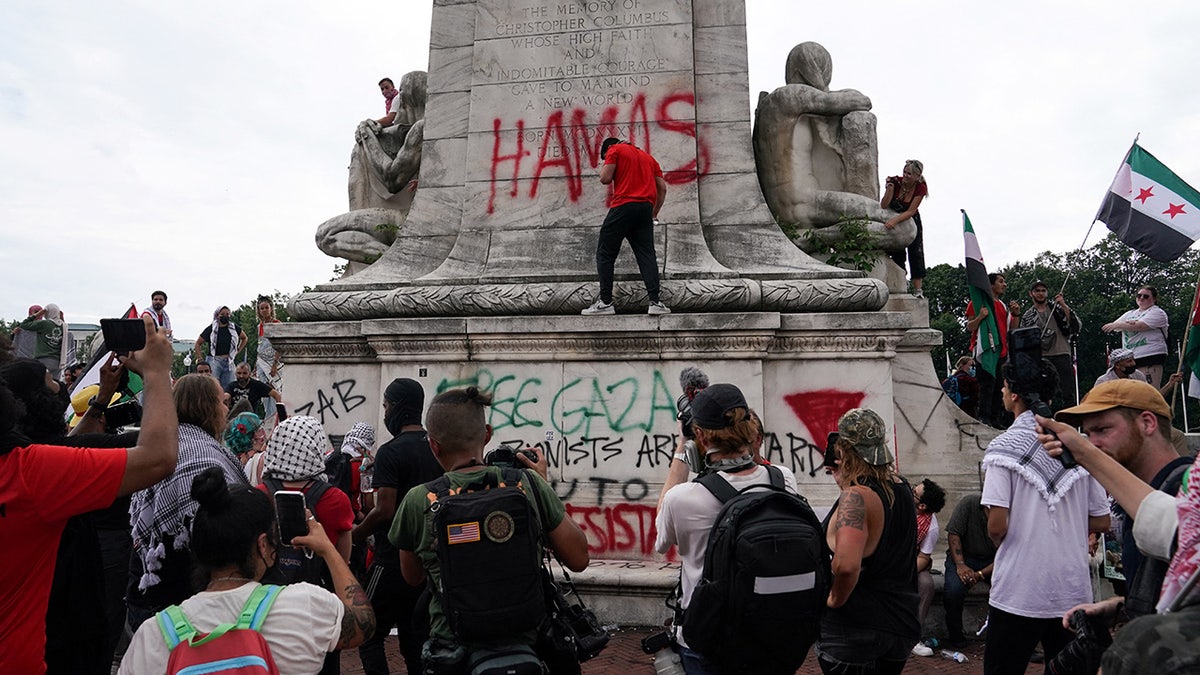
An anti-Israel demonstrator sprays graffiti on the Christopher Columbus Memorial Fountain at Union Station on the day of Israeli Prime Minister Benjamin Netanyahu’s address to a joint meeting of Congress on Capitol Hill in Washington July 24, 2024. (Reuters/Nathan Howard)
At least one demonstrator, whose face was covered, was spotted by Fox News carrying what appeared to be the flag of the terrorist group Hamas while others were heard shouting “Allahu Akbar.”
KAMALA HARRIS REACTS TO ANTI-ISRAEL RIOTS AT DC’S UNION STATION
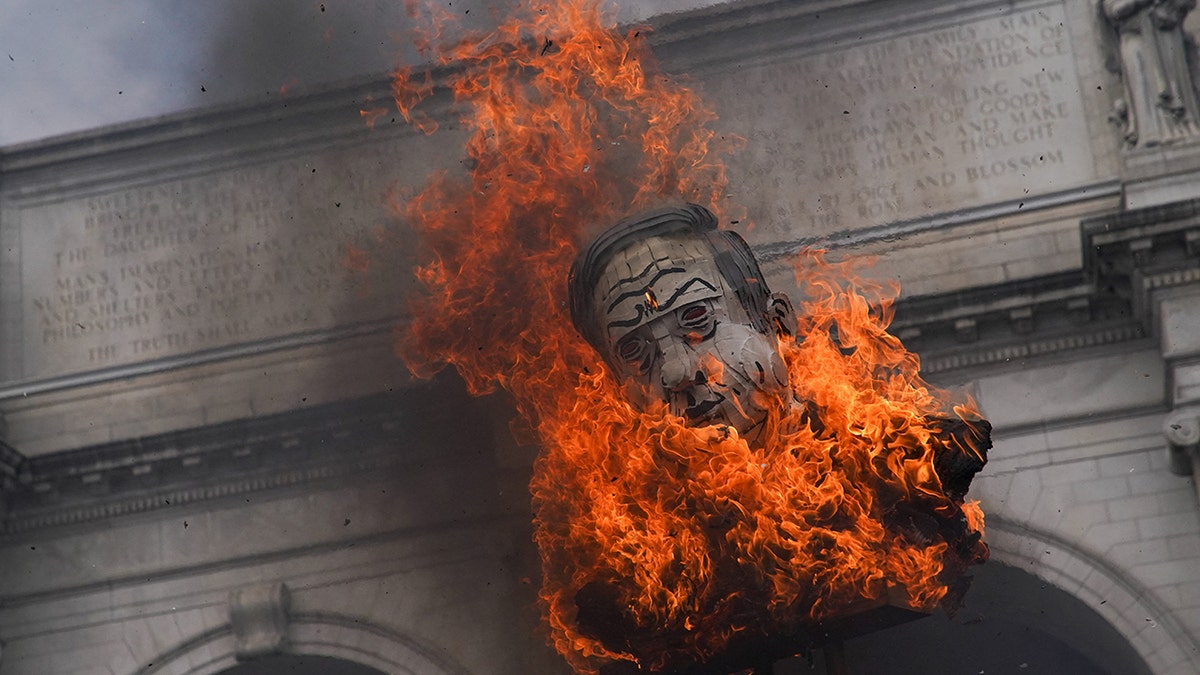
Anti-Israel demonstrators burn an effigy depicting Israeli Prime Minister Benjamin Netanyahu outside Union Station on the day of Netanyahu’s address to a joint meeting of Congress on Capitol Hill in Washington July 24, 2024. (Reuters/Nathan Howard)
The White House condemned the protests Wednesday evening, calling the chaos “disgraceful.”
“Identifying with evil terrorist organizations like Hamas, burning the American flag or forcibly removing the American flag and replacing it with another is disgraceful,” White House spokesperson Andrew Bates said in a comment to Fox News Digital Wednesday evening.
Politics
Ali: Kamala Harris has a campaign soundtrack: Beyoncé's 'Freedom'
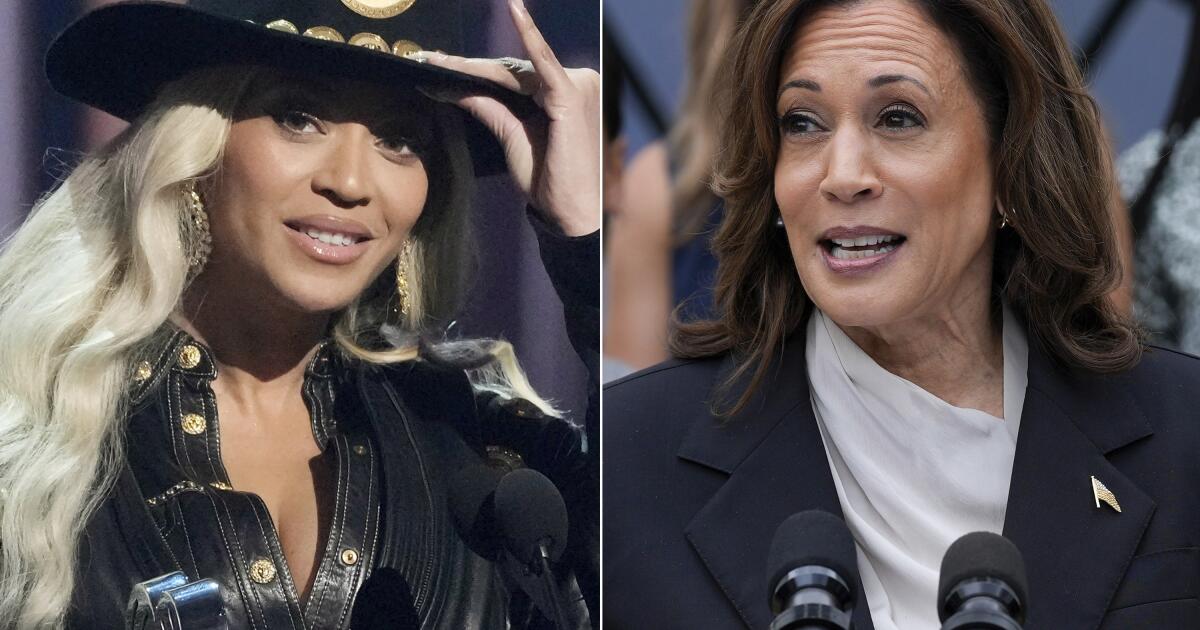
Vice President Kamala Harris’ bid for the presidency has a soundtrack: Beyoncé’s “Freedom.”
The leading Democratic presidential candidate took the stage in her first visit to her Wilmington, Del. campaign headquarters and again during her first campaign rally in Wisconsin as the song played.
Now the cathartic anthem graces Harris’ first campaign ad, in which she says: “There are some people who think that we should be a country of chaos, of fear, of hate. But us? We choose something different: We choose freedom.”
Pit that against the musical number her competitor chose for his grand entrance on Night 3 of the Republican National Conference. Donald Trump walked out to James Brown’s “It’s a Man’s, Man’s, Man’s World,” a tone-deaf choice for a former president found liable for sexual abuse, who’s bragged about sexually assaulting women, a married man who paid hush money to a porn star and a former president who rolled back women’s reproductive rights 50 years with the repeal of Roe vs. Wade.
Maybe the Godfather of Soul would have endorsed Trump’s usage of his song, but Brown would be breaking with decades’ worth of musicians who’ve decried GOP candidates playing their tracks at rallies and booster events. Adele, Rihanna, R.E.M., the Rolling Stones, Prince, Neil Young, Guns N’ Roses and Queen are among the many artists who’ve spoken out against Trump using their tunes for campaign purposes.
Heart bristled when the McCain-Palin campaign used “Barracuda.” Tom Petty insisted George W. Bush back away from “I Won’t Back Down.” Bruce Springsteen decried Ronald Reagan’s appropriation of “Born in the U.S.A.”
Beyoncé, however, gave Harris her blessing to use “Freedom,” a single from her 2016 blockbuster album “Lemonade.” The song, which features guest rapper Kendrick Lamar, is an explosive expression of empowerment. At the time of its release, it spoke to public outcry around police killings of unarmed Black men and women — Eric Garner, Tamar Rice, Freddie Gray — and protests that were largely fueled by the ire of younger generations.
Whether Beyoncé was singing about the tyranny of a cheating spouse or racial injustice (or both), the song became an anthem for a new, potentially potent block of the American electorate.
For the first time, Gen Z and millennials could now account for as many votes as baby boomers and their elders, groups that have made up a majority of the electorate for decades.
Folks under 40 have grown up with Beyoncé and her ubiquitous work. Think of Beyoncé like the Who for boomers — their work is everywhere (Republican Sen. Rand Paul played the band’s anti-war hit “Baba O’Riley” when he campaigned in 2015) — or Nirvana for Gen X, except no one cares what we think. Whatever, nevermind.
The Harris campaign’s smart choice of music coincides with a willingness to lean into a meme culture that shot up organically around the 59-year-old VP since President Biden announced Sunday that he was dropping out of the race.
Pop star Charli XCX showed her support for Harris when she tweeted “Kamala IS brat.” The British singer is referring to the TikTok and Twitter edits of Harris’ image superimposed to songs from Charli XCX’s hit album “Brat.” The avalanche of memes come from a video clip in which Harris talks about her mother’s response to the hubris of youth: “You think you just fell out of a coconut tree? You exist in the context of all in which you live and what came before you.”
Right-wing social media used the quote to deride Harris as inarticulate and a “word salad” master, but liberal swaths of Gen Z have since reworked the clip into emojis and memes that celebrate Harris’ nonconformist approach. She’s become a viral sensation, in a good way, unlike J.D. Vance’s damning “single cat lady” memes and a cringey internet joke about encounters with couches.
It’s rare that relevant talent will shill for a Republican candidate. Case in point: Trump’s pop culture ambassadors at this year’s RNC were Kid Rock, Kanye’s ex Amber Rose and former WWE wrestler Hulk Hogan, whose big moment was ripping his shirt off and screaming “Let Trump mania run wild!”
Harris chose to let freedom ring, and she has Queen Bey behind her.
Politics
Texas sues Biden administration over program giving birth control to teens without parents' knowledge

Texas officials are challenging a recent order from President Biden’s administration that would allow schools to distribute birth control to teenagers without parental consent.
Texas Attorney General Ken Paxton announced Thursday that his office is suing the Biden administration over their 2021 change to Title X guidelines banning parental consent requirements for birth control services.
“By attempting to force Texas healthcare providers to offer contraceptives to children without parental consent, the Biden Administration continues to prove they will do anything to implement their extremist agenda — even undermine the Constitution and violate the law,” Paxton said in a statement.
TRUMP SAYS HE ‘WILL NEVER ADVOCATE IMPOSING RESTRICTIONS ON BIRTH CONTROL’ OR OTHER CONTRACEPTIVES
A woman takes the next pill from a monthly pack of contraceptive pills. (Annette Riedl/picture alliance via Getty Images)
The Texas legal battle began in Dec. 2021 when US District Judge Matthew Kacsmaryk ruled that Title X — the federal program that provides free, confidential contraception to anyone regardless of age, income or immigration status — violates parental rights and violates state and federal laws.
The case was argued by former solicitor general of Texas Jonathan Mitchell, representing father Alex Deanda, who said he was “raising each of his daughters in accordance with Christian teaching on matters of sexuality, which requires unmarried children to practice abstinence and refrain from sexual intercourse until marriage.”
SCHUMER PLANS VOTE ON ‘CONSTITUTIONAL RIGHT TO CONTRACEPTION’ IN BID TO PROTECT SENATE DEMOCRAT MAJORITY
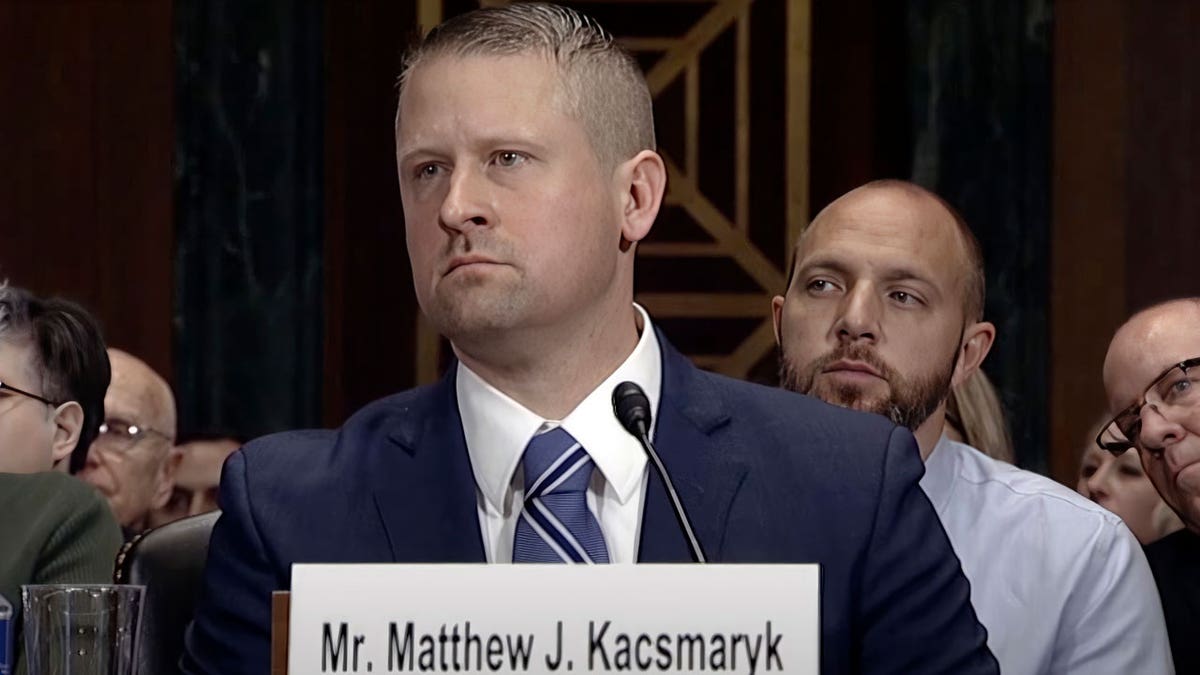
Kacsmaryk, a Trump appointee, previously ruled that parents must be informed when birth control is provided to their children under 18 years old. (Senate Judiciary Committee via AP)
In response, the federal government updated guidelines to state that Title X projects “may not require consent of parents or guardians for the provision of services to minors, nor can any Title X project staff notify a parent or guardian before or after a minor has requested and/or received Title X family planning services.”
Paxton is now seeking a permanent injunction on this rule, which he claims defies the findings of the federal court.
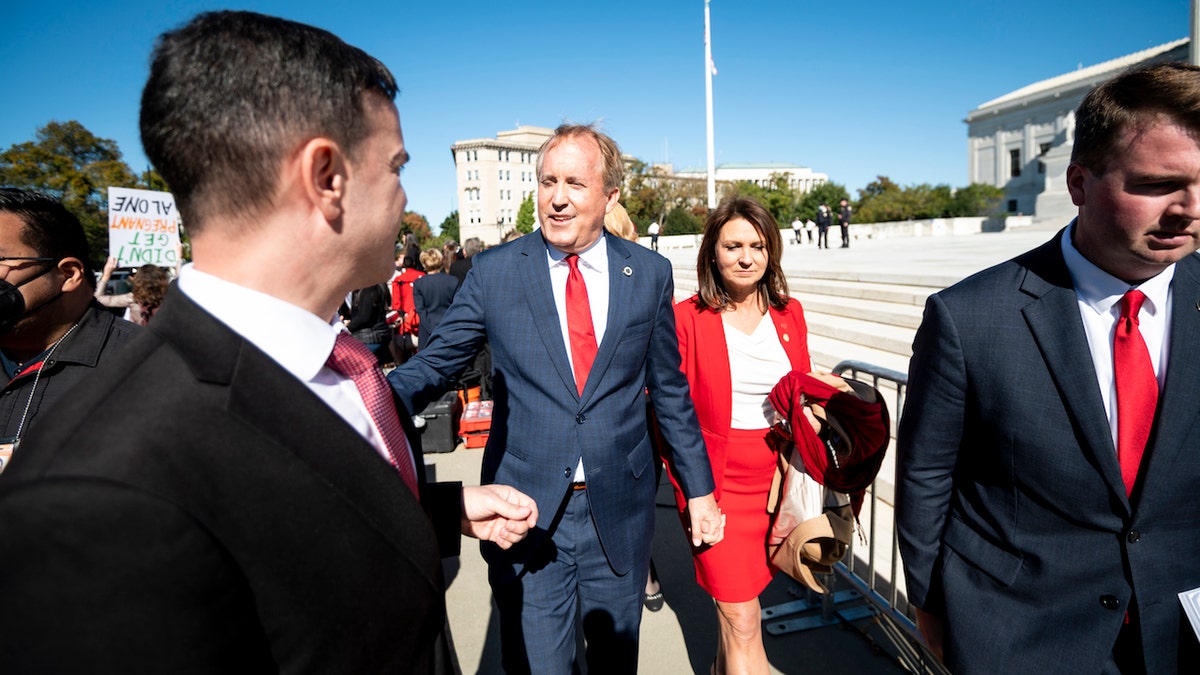
Paxton and his wife Angela are pictured outside the Supreme Court. (Bill Clark/CQ-Roll Call, Inc via Getty Images)
Paxton filed the lawsuit in a federal court in Amarillo. It will likely be heard by Kacsmaryk, the same judge who previously ruled parents must be informed of birth control provided to their children.
-

 World1 week ago
World1 week agoOne dead after car crashes into restaurant in Paris
-

 Midwest1 week ago
Midwest1 week agoMichigan rep posts video response to Stephen Colbert's joke about his RNC speech: 'Touché'
-

 News1 week ago
News1 week agoVideo: Young Republicans on Why Their Party Isn’t Reaching Gen Z (And What They Can Do About It)
-

 Movie Reviews1 week ago
Movie Reviews1 week agoMovie Review: A new generation drives into the storm in rousing ‘Twisters’
-

 News1 week ago
News1 week agoIn Milwaukee, Black Voters Struggle to Find a Home With Either Party
-

 Politics1 week ago
Politics1 week agoFox News Politics: The Call is Coming from Inside the House
-

 News1 week ago
News1 week agoVideo: J.D. Vance Accepts Vice-Presidential Nomination
-

 World1 week ago
World1 week agoTrump to take RNC stage for first speech since assassination attempt













